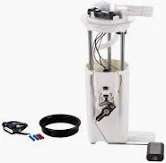Oftentimes, a fuel pump fails when it overheats and you will notice the engine running poorly right away. Fuel pumps are susceptible to failure when temperatures go beyond the normal operating range(for which it is designed) but ideally, should not overheat. The pump may lose its will to go on, following a hot and torrid night of overheating. A pump that's supposed to hold 50 PSI steady might fall way off, causing inadequate fuel delivery. A good fuel system that has been well maintained can endure for more than 100,000 miles but when overheated it could be fried away in as little as a few thousand dragging all of your hard-earned money down the pit with it.
We have heard cowboy-like industry experts frequently claim that modern cars use a sophisticated form of electronic fuel injection and this imposes the absolute need for an operational low, or high pressure fuel pump to provide hot steamy gas at certain bar pressures. Overheating of the pump may also lead to misfiring or engine stalling. Indeed, car makers note that fuel pumps working at over 170°F (76°C) start to rapidly degrade leading to potential total failure.
In certain cases, fuel pumps have been known to overheat during high-demand conditions; for example--extensive idling in hot weather or when towing heavy loads. A fleet of delivery trucks that experienced overheating fuel pumps was one such example, which had caused major delays. With an average cost of $300 to replace a fuel pump and up toward around the $1,000 mark depending on your location/vehicle.... That can break budgets for operations running off vehicle fleets.

This is something the automotive industry works on all of the time. Bosch and other companies like Walbro manufacture high-quality motorcycle fuel pumps with improved cooling properties to prevent such overheating issues. Bosch, for example, added pumps with built-in temperature probes that adjust the pump off when it reaches hazardous levels. This of course is an old saying by Henry Ford and it reflects the commitment manufacturers make in their pursuit to improve fuel pump reliability - all based on proper design and good-quality materials.
Low fuel in the tank can also cause overheated pump. One of the roles fuel plays is as a lever for in-tank fuel pumps to cool down; As the gas levels drop too low, so does its function cooling off the pump and it heats up faster. For this reason, mechanics will often say to keep at least a quarter tank of gasoline in your reservoir so you can prevent spiking and hence improve the life of yours fuel pump. The pump can overheat and quickly fail if you do not listen to this warning.
Symptoms of a fuel pump overheating usually consist of similar sounding whining, engine sputtering, or sometimes just not starting. In performance applications, fuel pumps such as the above are under additional strain and can overheat more easily, especially at a track day or in stop-and-go driving. Deceptive supply pump can refuel the car general failure, fuel per liter of oil may increase by 10–15%. Taking care with regular maintenance and replacing the Fuel Pump before it fails are good insurance measures that drivers can take to avoid breakdowns.